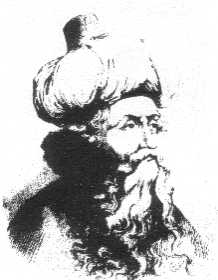Ibn 'Arabī
| Ibn ʿArabi | |
|---|---|

Ibn 'Arabī
|
|
| Born | 26 July 1165 Murcia, Taifa of Murcia (now Murcia, Region of Murcia, Spain) |
| Died | 16 November 1240 (aged 75) District of Ṣāliḥiyya at Jabal Qāsiyūn, Damascus, Ayyubid dynasty |
| Era | Islamic golden age |
| School | Sufism |
|
Main interests
|
Mysticism, Sufi metaphysics, Poetry |
|
Influences
|
|
Ibn ʿArabi (full name Abū ʿAbd Allāh Muḥammad ibn ʿAlī ibn Muḥammad ibnʿArabī al-Ḥātimī aṭ-Ṭāʾī أبو عبد الله محمد بن علي بن محمد بن عربي الحاتمي الطائي 26 July 1165 – 16 November 1240), was an ArabAndalusian Sunni scholar of Islam, mystic, poet, and philosopher. He is renowned among practitioners of Sufism as Shaykh Al-Akbar "the greatest master" and also as a saint.
'Abū 'Abdullāh Muḥammad ibn 'Alī ibn Muḥammad ibn `Arabī al-Ḥātimī aṭ-Ṭāʾī (أبو عبد الله محمد ابن علي ابن محمد ابن عربي الحاتمي الطائي) was born in Murcia, Taifa of Murcia on Monday, 17th of Ramaḍān 560 AH (26 July 1165 AD) at night. His father was from the tribe of Tayy and claimed descent from the legendary Arabian poet Hatim al-Tai. His mother came from a noble Berber tribe with strong ties to northern Africa. Al-Arabi mentions his maternal uncle, Yahya ibn Yughman, who was at one point a wealthy prince of the city of Tlemcen, but had left that position to lead a life of spirituality after encountering a Sufi mystic.
He went by the names al-Shaykh al-Akbar (i.e., "the Great Shaykh") and Muḥyiddin ibn Arabi. He was also known as Shaikh-e-Akbar Mohi-ud-Din Ibn-e-Arabi in the Subcontinent.
His father, ‘Ali ibn Muḥammad, served in the Army of Abu ʿAbd Allah. When Abu ʿAbd Allah died in 1172 AD, ‘Ali ibn Muḥammad swiftly shifted his allegiance to the Almohad Sultan, Abū Ya’qūb Yūsuf I, and became one of his military advisers. His family then relocated from Murcia to Seville.
...
Wikipedia
